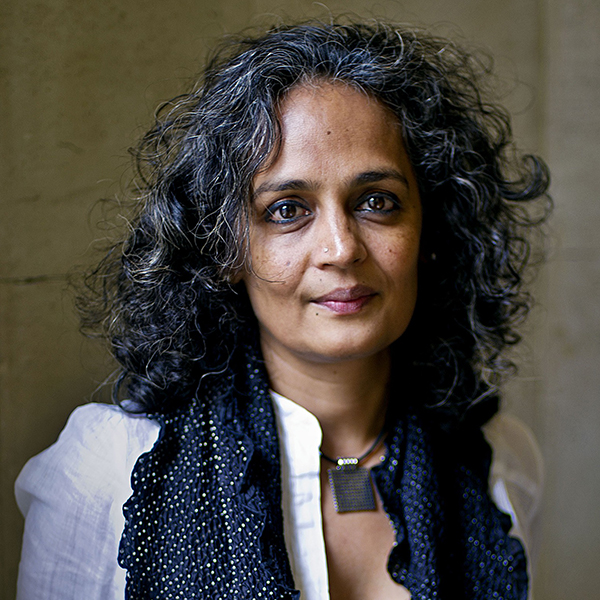Arundhati Roy

Born as Suzanna Arundhati Roy in Bengal, on November 24, the daughter of Rajib Roy, a Bengali Hindu tea plantation manager, and Mary Roy, a Keralite Syrian Christian.
Is raised and educated in Aymanam, Kerala, at her mother's school, Corpus Christi.
Parents divorce during her childhood, leaving AR with feelings of vulnerability for herself and her family, always living "on the edge of the community."
Leaves home for Delhi, where she lives in a hut in a squatters' camp and sells empty bottles for money.
Enrolls in the Delhi School of Planning and Architecture.
While enrolled she meets her first husband, architect Gerard da Cunha.
de Cunha and Roy divorce.
Meets her second husband, filmmaker Pradip Krishen, because he offers her a role as a tribal girl in his award-winning movie Massey Sahib.
Works various jobs, including running aerobics classes at five-star hotels in New Delhi.
Writes a number of successful TV films screenplays
Writes and stars in In Which Annie Gives It Those Ones, which is directed by Krishen.
Writes the script for Electric Moon, also directed by Krishen.
Writes a review of Shekhar Kapur's film Bandit Queen, which is about the exploits of Phoolan Devi, a woman who, throughout her life, was consistently a victim of rape and molestation from men of higher castes. She lived a criminal life, and eventually sought revenge on some of her attackers by massacring 22 higher-caste men at a village wedding. Kapur's film Europeanizes Devi, and, Roy believes, exploits her. Devi herself fought to have the film banned in India. Roy's review article ends up in a lawsuit, after which she retires from public life to work on The God Of Small Things.
The God Of Small Things is published, to great controversy. She is charged with undermining public morality. The £ 500,000 advance is more than Vikram Seth received in 1993 for A Suitable Boy, perhaps the longest novel to be published in a single volume in English (1488 pages).
The God Of Small Things wins the Booker Prize, Britain's biggest literary award. Roy is the first non-expatriate Indian author and the first Indian woman to win this prize, in the year of India's celebration of 50 years of independence from Britain.
Publishes The Cost of Living, which is an argument against the building of the Narmada Dam. The second half of the book contains her essay on India's detonation of a nuclear bomb. She argues that rather than bringing power to India, the bomb is the "ultimate colonizer" — "the most antihuman, outright evil thing."
Publishes Power Politics, which addresses the building of dams which dislocate hundreds of thousands of people, the globalization of the world economy, and the privatization of India's power supply by U.S.-based energy companies.
Publishes War Talk, which highlights the global rise of militarism and religious and racial violence. Against the backdrop of nuclear brinkmanship between India and Pakistan, the horrific massacre of Muslims in Gujarat, and U.S. demands for an ever-expanding war on terror, she calls into question the equation of nation and ethnicity.
Publishes The Checkbook and the Cruise Missile with David Barsamian. These conversations between the two began in February 2001, and presage the September 2001 attack and trace the subsequent War on Terror to the invasion and occupation of Iraq. Roy represents the thoughts of people worldwide who are coming to know the United States through the machinations of multinational corporations and the military.
Awarded the Sydney Peace Prize for her work in social campaigns and advocacy of non-violence.
Publishes An Ordinary Person's Guide to Empire, a collection of essays in which she she exposes what she perceives as the hypocrisy of the Bush administration, and reminding readers that the power of the people to oppose their leaders' tyranny is the foundation of democracy. She advocates using nonviolent organizing to sabotage the war in Iraq and draws attention to the subtle connections between globalization in India, devastation in Iraq, and poverty among African Americans.
Announces beginning work on a second novel.
Begins to write and publish a long series of non-fiction and essays.
The Shape of the Beast: Conversations with Arundhati Roy
Listening to Grasshoppers: Field Notes on Democracy.
Broken Republic: Three Essays
Walking with the Comrades
Kashmir: The Case for Freedom
The Hanging of Afzal Guru and the Strange Case of the Attack on the Indian Parliament
Capitalism: A Ghost Story
Things that Can and Cannot Be Said: Essays and Conversations
The Doctor and the Saint: Caste, Race, and Annihilation of Caste (The Debate between B.R. Ambedkar and M.K. Gandhi)
Her second work of fiction, The Ministry of Utmost Happiness: A Novel, is published.